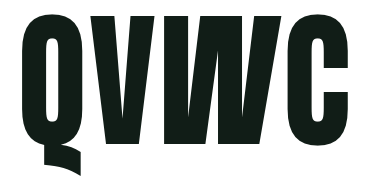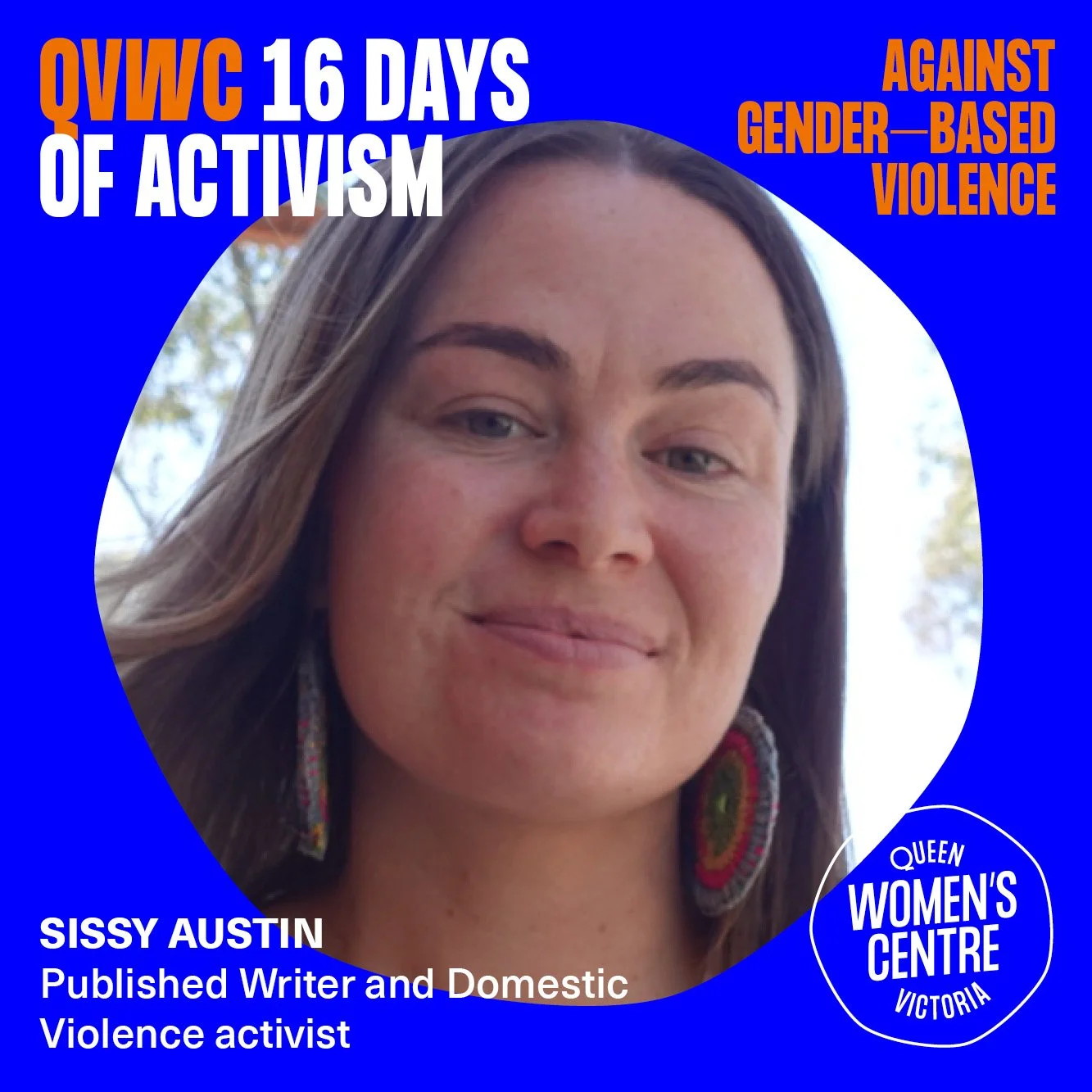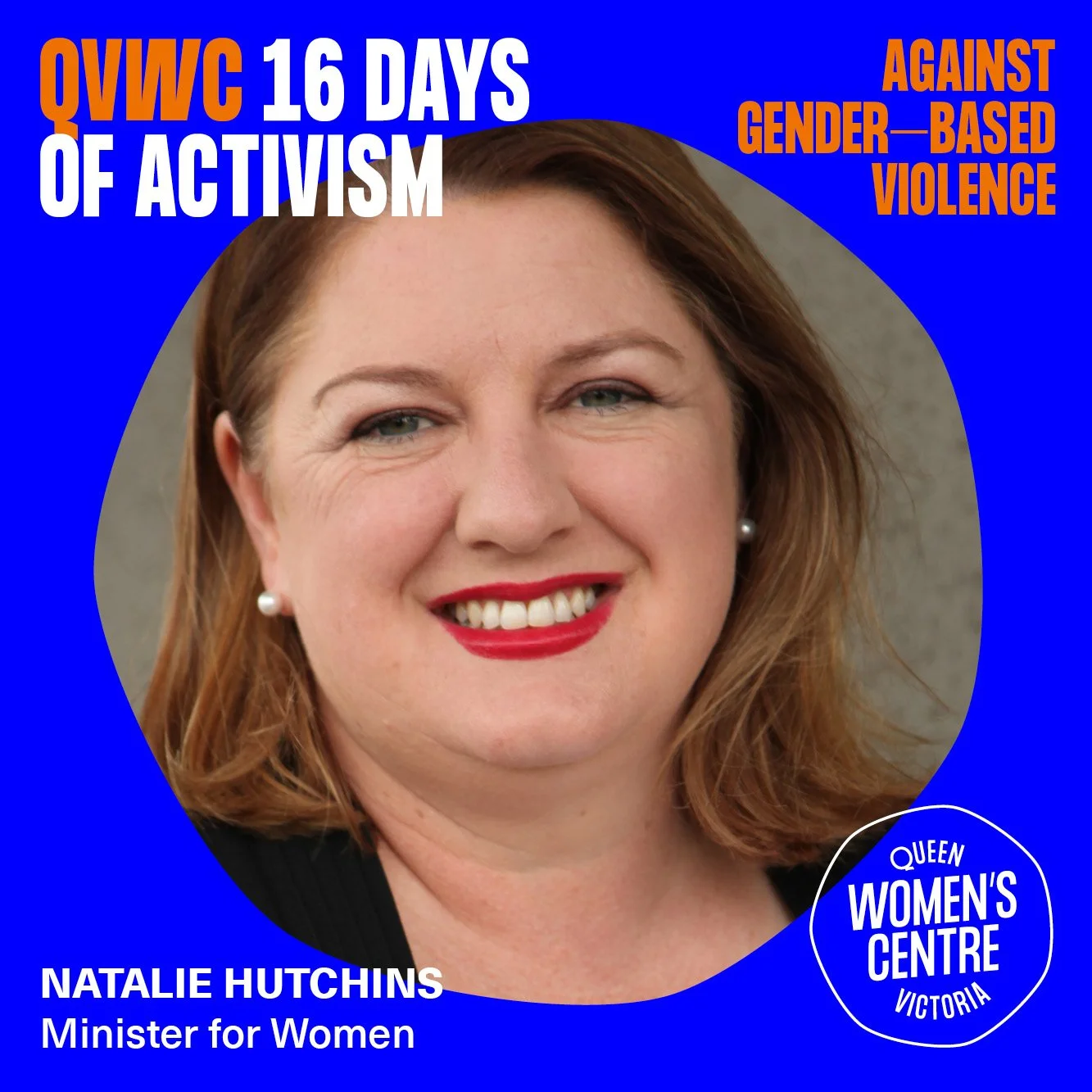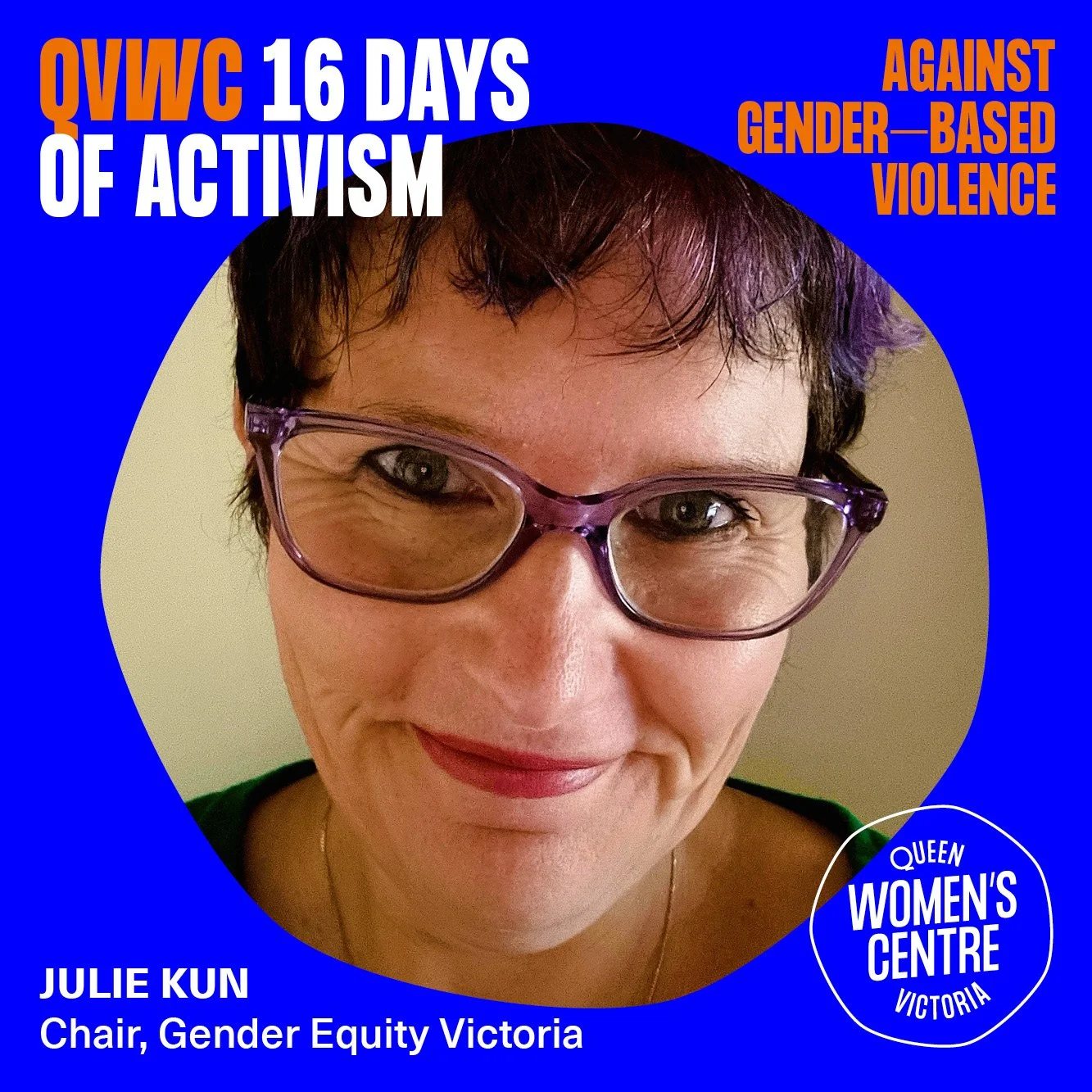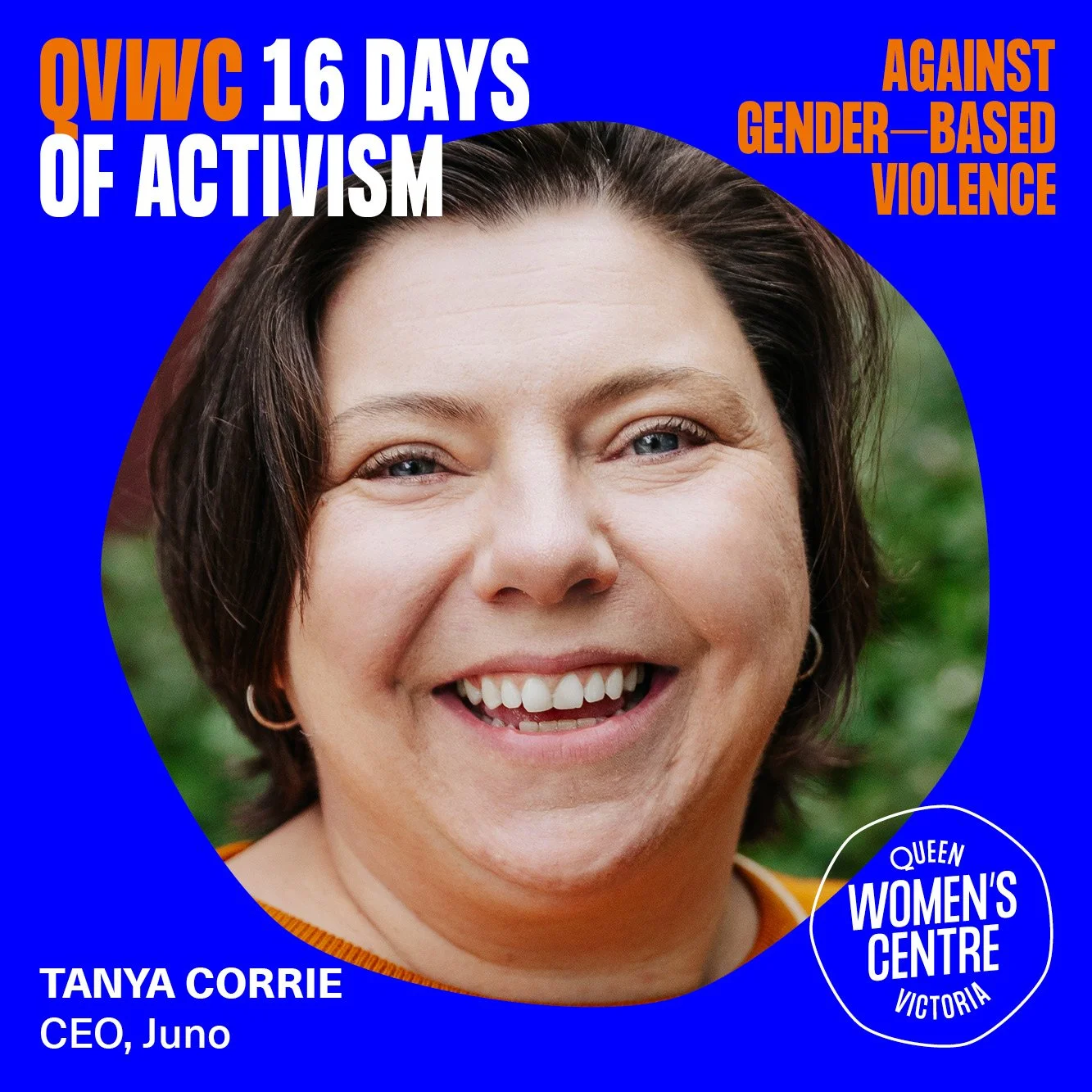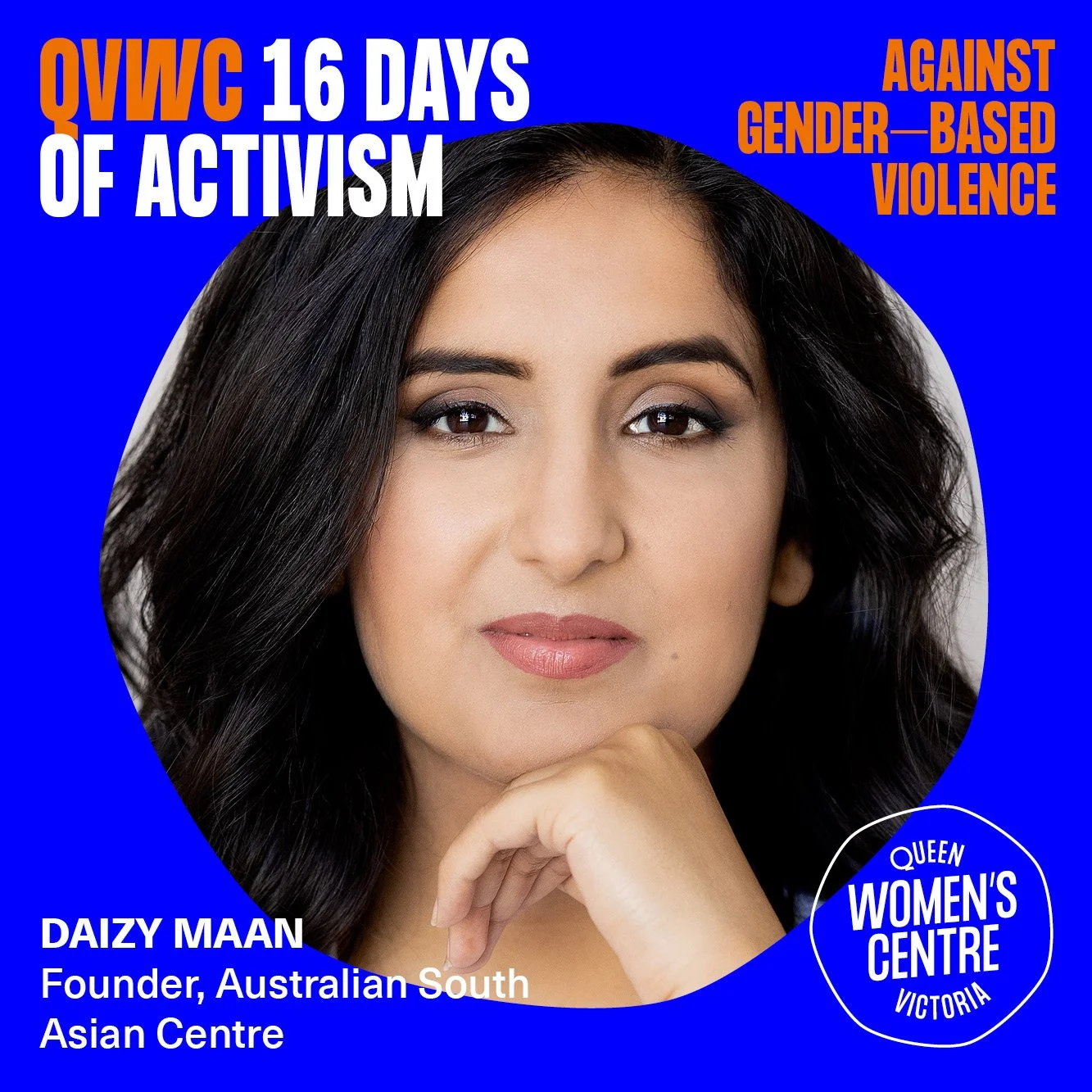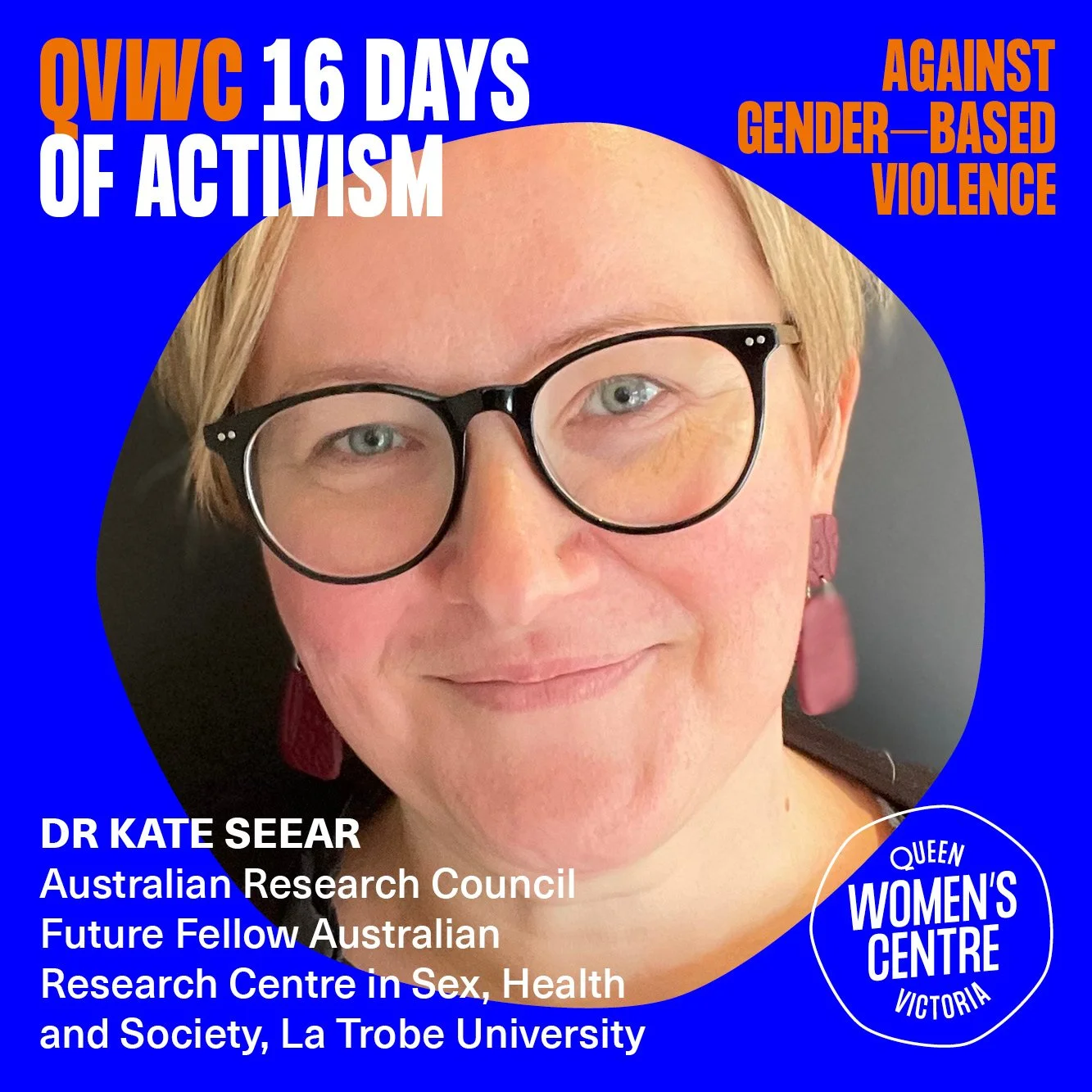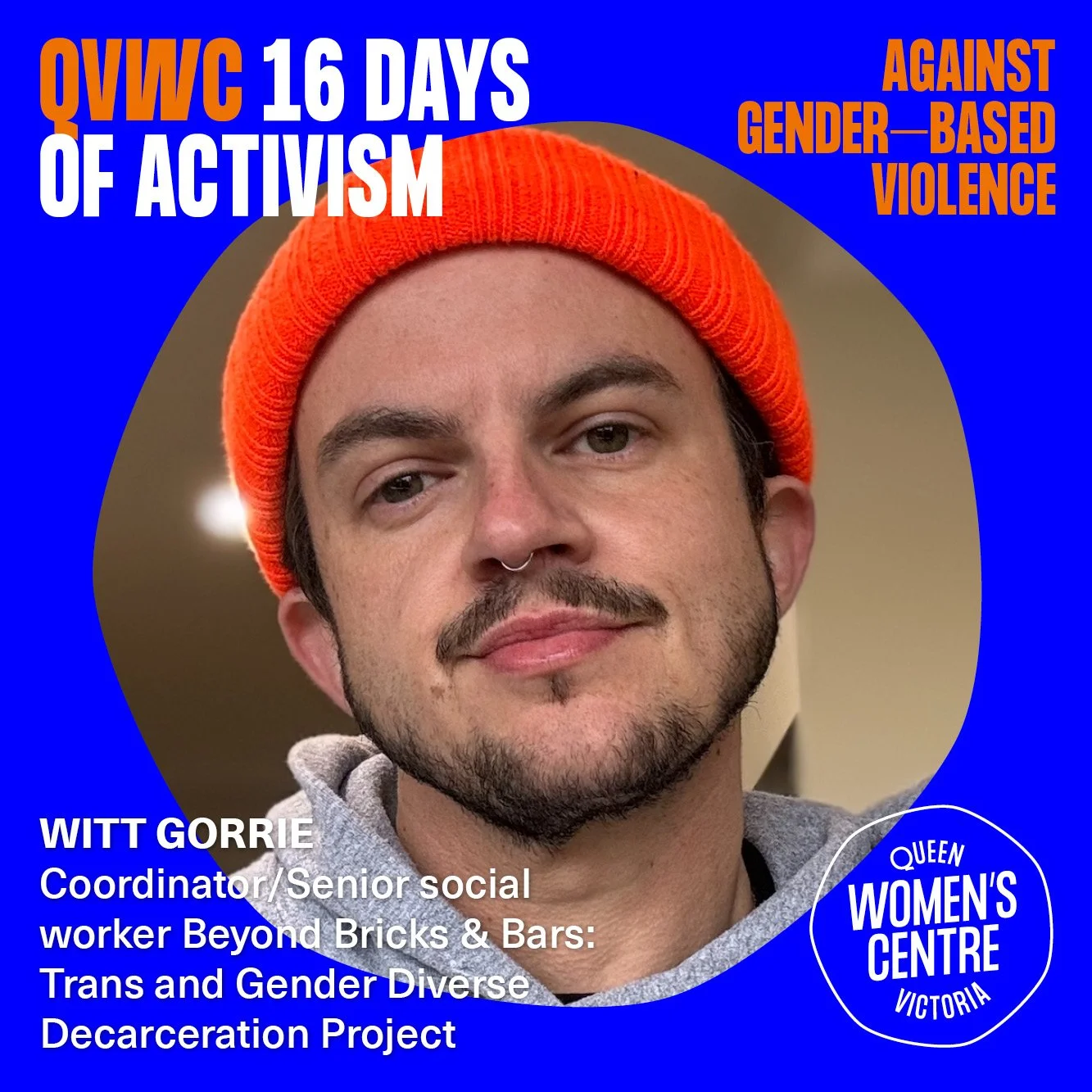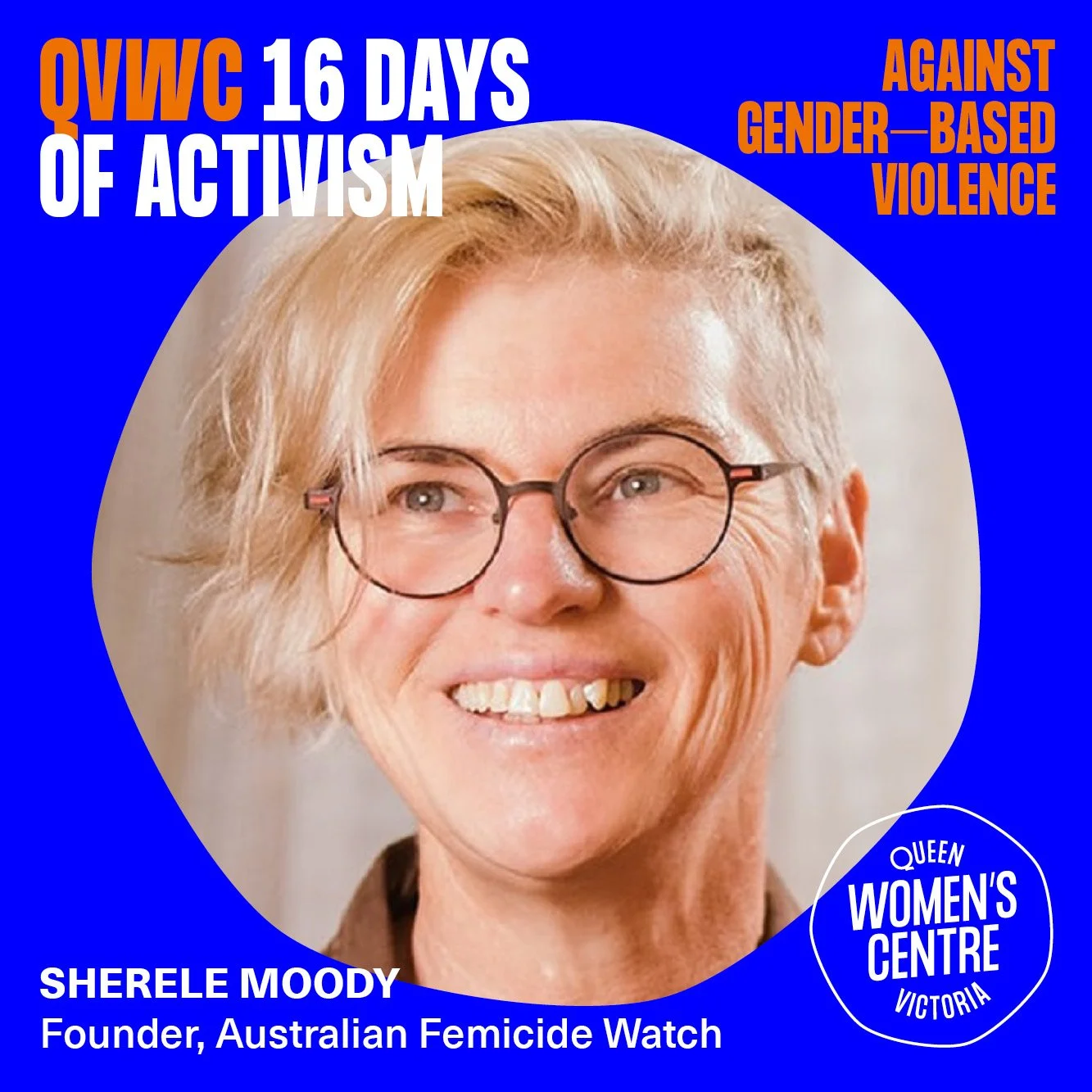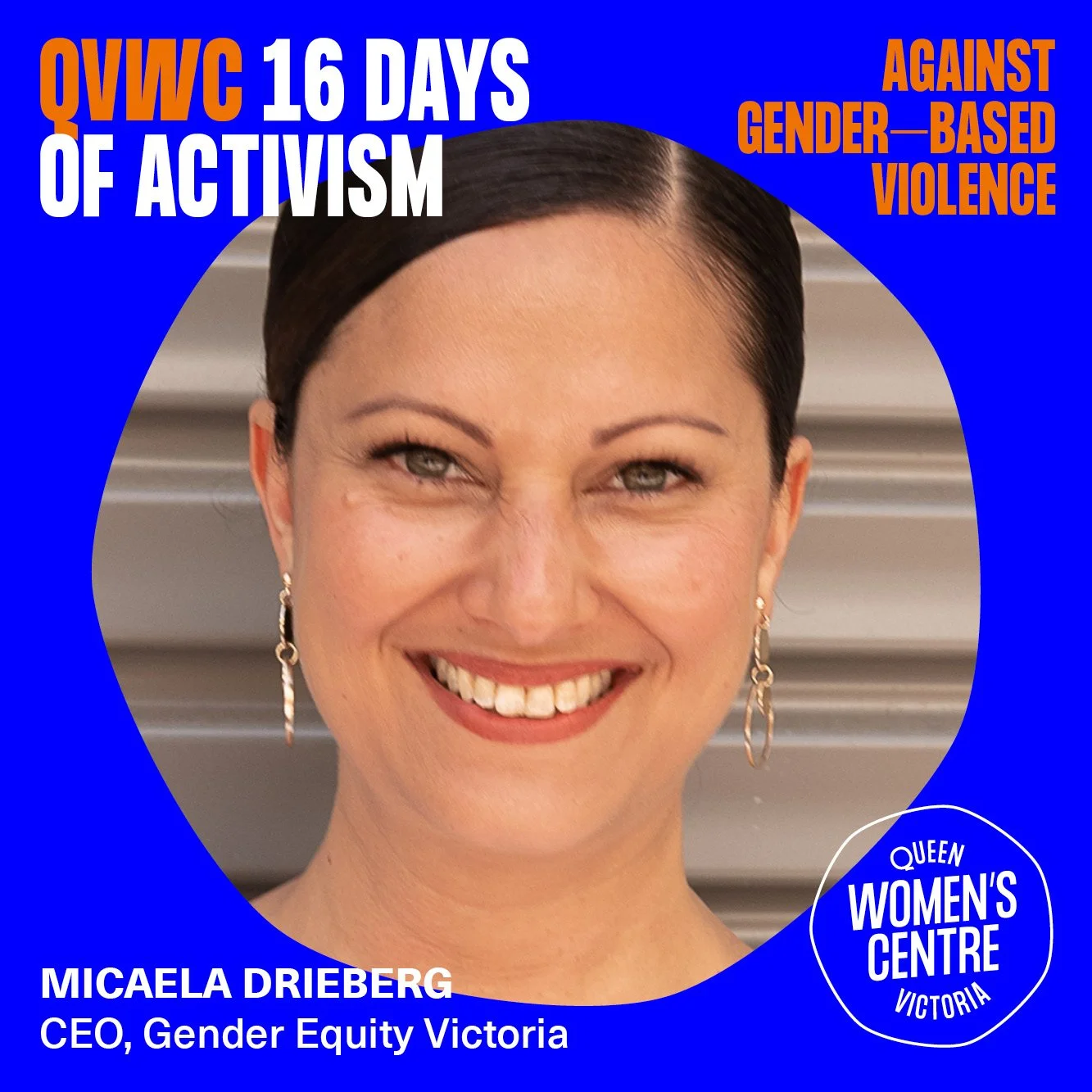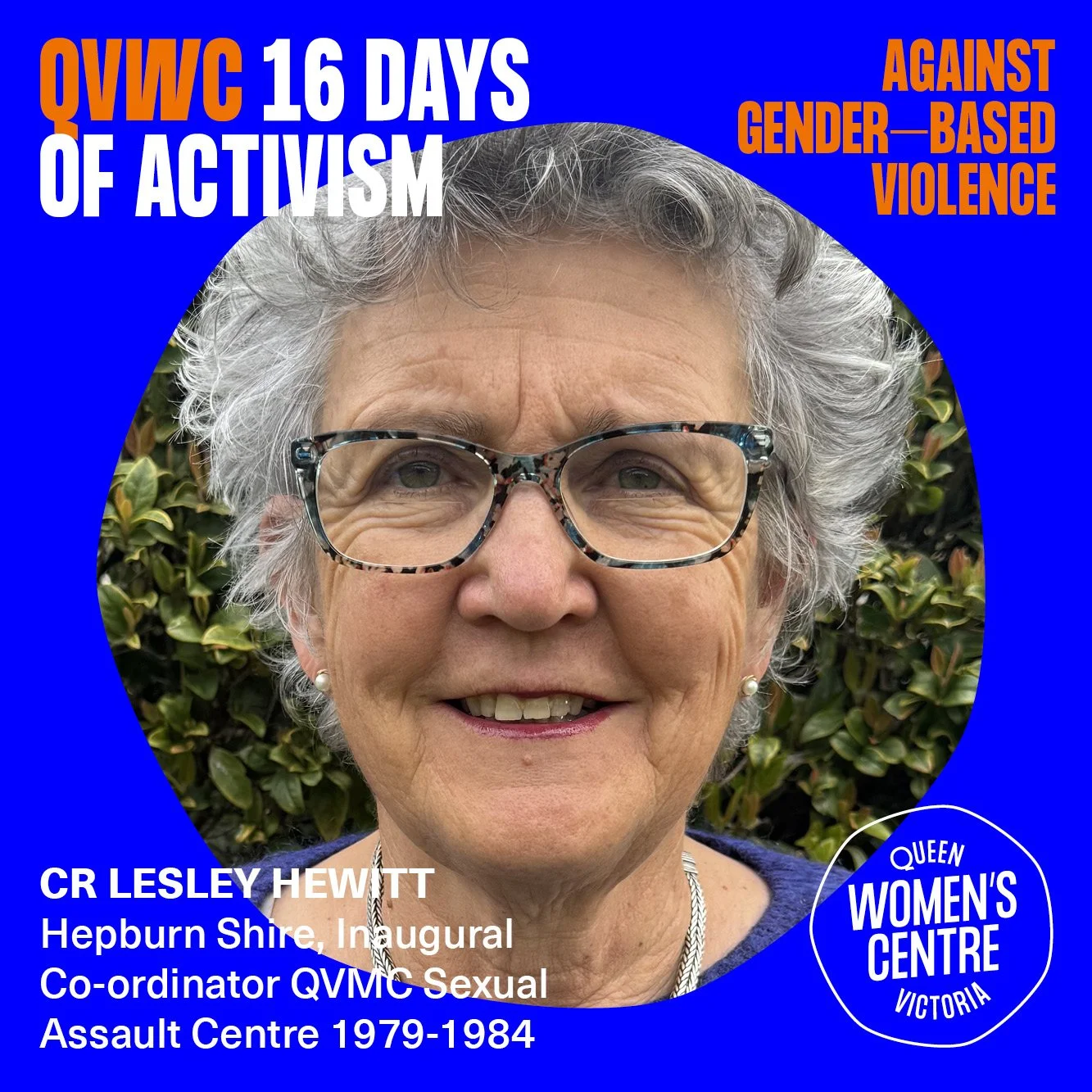QVWC 16 Days of activism AGAINST GENDER BASED VIOLENCE
UN Women kicks off a UN-wide annual campaign on 25 November, the International Day to End Violence against Women.
Over the following 16 Days of Activism against Gender-Based Violence, we are asking governments, institutions, and citizens to show us how much the world cares about ending violence against women and girls.
According to Destroy the Joint’s Counting Dead Women, 66 women have been killed by violence. With six weeks remaining in 2024, the register of women killed has already surpassed last year’s total – 64.
Sherele Moody’s Australia Femicide Watch, which takes a different approach to updating its toll and includes Australian women killed overseas, reports 86 women killed by violence this year.
Read our Q&As below with leaders and advocates from our community working in the sector to end violence against women and gender diverse people.
SISSY AUSTIN, published writer & domestic violence advocate
What does 16 Days of Activism mean to you?
To me 16 Days of Activism means centring First Nations women’s voices and experiences of violence in the movement. It is taking a stand against all violence, physical, psychological, genocidal and colonial.
Has anything changed for the positive since we spoke about the campaign 12 months ago?
Last time we spoke, was before the three alleged murders of women in Ballarat, which all occurred within the first 2 months of 2024. Whilst it was a harrowing time for the families and community, what is really important to highlight is following these tragic deaths, the regional community of Ballarat took to the streets and marched under the banner “Enough is Enough”, a stance that made headlines throughout the country.
What role do you play day to day in campaigning to reduce gender-based violence?
The role I play in reducing gender-based violence is advocating for people to understand that colonial violence is a key driver in violence towards women, not only colonial violence in Australia but also in the genocidal violence towards women and children in Palestine. When we condone violence ‘somewhere’ we accept violence everywhere. Practically, I love to write, much of my writing is about reducing gender-based violence, particularly towards women whilst exercising in public spaces.
Natalie Hutchins, Minister for Women, Victorian Government
What does 16 Days of Activism mean to you?
Violence against women and girls is still endemic in our society – despite the progress women have made towards equality in other areas.
The 16 Days of Activism gives women a platform to demand better. As a Minister, it serves as a reminder to me that we cannot drop the ball on tackling family violence. We cannot excuse the fact that many women are not safe or respected in their relationships. Everyone needs to play their part in making change, particularly men.
Tell us about the work the Victorian Government is doing with the Gender Equality Strategy, Our Equal State.
Our Equal State is about making sure that the voices of all Victorians, especially those that are marginalised, are heard so we can all live in a better society. This means addressing the barriers and injustices women face – like economic inequality, discrimination and, still, often facing family violence. This Government’s gender equality work will help right these wrongs – and will empower the next generation to shape the world so it’s more equal.
What does success look like to you? How will you know you have made a difference?
We’ll know we’ll have made a difference when we see every woman in Victoria able to reach her potential – that’s through reaching economic security, following her career dreams, or being safe and respected in her family. That’s a long journey but it’s not a negotiable one. Women are half of our society but still get shortchanged far too often. We’ll know we’ve made a difference when women are empowered and supported – helping us reach equality, finally.
JULIE KUN, CHAIR, GENDER EQUITY VICTORIA
What does 16 Days of Activism mean to you?
16 Days of Activism is a time to unite and welcome new allies to the ongoing campaign to end violence against women and girls. It’s about recognising our movement’s strength, celebrating successes, and acknowledging the ongoing challenges to end gendered violence. It is a further opportunity to centre and acknowledge victim-survivors and those who did not survive and amplify the voices of women and girls whose experiences are marginalised and minimised such as First Nations, multicultural and trans women and girls, as well as women and girls with disabilities.
What’s the one thing that you would change now so we can live in a violence free Victoria?
Whilst it is misleading to think that one change or policy shift will in and of itself create a Victoria free of violence, there are changes that can and must be made that can powerfully step us towards a violence-free Victoria. One powerful shift is putting more resources and emphasis into educating and supporting boys and men with compassion to live and act in ways that are respectful to women and girls and enable themselves and women and girls to be safe. We also need to work with the full diversity of Victoria’s communities, avoiding the cookie-cutter approach, embedding gender equity and attitudes and behaviours of respect whilst simultaneously supporting all family violence victim-survivors to receive the ongoing support they need from crisis response to long-term recovery.
What role do you or your organisation play in reducing gender-based violence?
Gender Equity Victoria (GEN VIC) is an independent member association that facilitates and elevates a connected, coordinated and independent gender equity movement that works collaboratively to build gender equity across Victoria. We provide opportunities for the gender equity sector to partner with each other to work with and influence government, private industry and the community sector. Primary Prevention is intertwined with gender equity work and occurs across many settings, including but not limited to schools and early education, councils, government, community sector, health, sporting institutions, faith-based organisations and private industry. Our members have a vital role to play in reducing gender-based violence.
NINA STOREY, FAMILY VIOLENCE JUSTICE PROJECT COORDINATOR, FLAT OUT
What does 16 Days of Activism mean to you?
‘Abolish Strip Searching it is State Sanctioned Sexual Violence’
Is important for communities worldwide to come together, take action and join hands in the call to end all violence, it means to me ending the systemic violence we have to face as a result for reaching out for support. It’s a time to raise the voices and elevate the living experiences of those that have survived and continue to survive.
What’s the one thing that you would change now so we can live in a violence free Victoria?
Systemic collusion, harm, abuse and violence is something all victim survivors face but is often missing from the conversations. We are all familiar with the question “why didn’t she just leave?” for me this is a systemic issue – she doesn’t leave because she is not supported to, with housing, children, financially resourced, supported, heard or even listened to. So many of us that come forward are misidentified, charged and convicted.
Further exacerbating the systemic harm abuse and violence. Women are subjected to state sanctioned sexual abuse in prisons and in community by officers in power. This practice must be abolished to ensure the protection of all people. We cannot continue to legally allow men and women to perform such degrading dehumanising violent acts!
What role does your organisation play in reducing gender-based violence?
Flat Out advocates fiercely in their daily practice against systemic collusion, harm, abuse and violence – all of our work is underpinned by reducing and preventing systemic violence. We providing training and education around resisting systemic collusion how to be person centred and trauma informed in every aspect of our work. We work alongside the Human Rights Law Centre in abolishing strip searches and launching the report on the 5th of March 2025 at our home the Queen Victoria Women’s Centre.
TANYA CORRIE, CEO, JUNO
What does 16 Days of Activism mean to you?
16 Days of activism to me is an opportunity to continue to make noise and raise awareness that we still have a long way to go in ending gender-based violence.
What’s the one thing that you would change now so we can live in a violence free Victoria?
I would dismantle the rigid gender roles and structures that reinforce harmful stereotypes and fuel/enable gender-based violence across our communities. By challenging these roles, we can help to create a culture of respect, equality, and safety for everyone.
What role does your organisation play in reducing gender-based violence?
As well as providing critical support and programs for trans and cis women and non-binary people, a really important part is advocating and agitating for systemic change. We advocate for a society where women and non-binary people can live free from violence and thrive in their homes, communities, and in public life.
CLAUDIA FATONE, CEO, WOMEN’S LEGAL SERVICE VICTORIA
What does 16 Days of Activism mean to you?
To me the 16 Days of Activism is an opportunity for the community to come together to highlight the continuing violence that women are experiencing and the gender inequality that enables violence supporting attitudes. Importantly, it is also an opportunity to come together to advocate for change.
What’s the one thing that you would change now so we can live in a violence free Victoria?
We know that housing is critical for victim-survivors of violence to build a life free from violence. Currently too many women are faced with an impossible choice - access to secure housing or safety from family violence. In the last financial year a quarter of the women Women's Legal worked with were homeless, or at risk of homelessness. While ideally victim-survivors would be able to stay in their homes, the reality is that many victim-survivors need to leave their home to find safety. Improving access to safe, secure and affordable housing for victim-survivors escaping violence needs to be urgently addressed.
What role does your organisation play in reducing gender-based violence?
Women's Legal provides high quality, trauma and gender informed legal services for Victorian women, with a wrap-around model where clients are also supported by social workers and financial counsellors.
We specialise in family violence, family law, migration law, child protection law, victims of crime assistance, and sexual assault – recognising the intersection between the jurisdictions. We also deliver training to build the capacity of lawyers and other professionals to better support family violence victim-survivors to get the legal and social support they need, as well as advocacy to improve system responses to gendered violence.
DAIZY MAAN, FOUNDER AUSTRALIAN SOUTH ASIAN CENTRE
What does 16 Days of Activism mean to you? Showing up and speaking up. As a Punjabi / South Asian woman I often hear that preserving the reputation of a community is more important than believing victims. This perpetuates a cycle of abuse. I feel strongly that it is our responsibility to stand up against violence and use our privileges to speak up. It’s about solidarity and being part of a movement that says enough is enough.
What’s the one thing that you would change now so we can live in a violence free Victoria? On an individual level it would be to use your voice to speak up when people you know / friends / family are being sexist. On a government / funding level- fund and invest in more services led by culturally and racially marginalised women with lived experience of gendered violence.
What role does your organisation play in reducing gender-based violence? Australian South Asian Centre is a community of 100+ Indian, Sri Lankan & South Asian women (plus allies) who care about making a difference. We create & curate spaces where women are comfortable to come as their whole selves and lean on each other. We also use storytelling and the arts as a tool to challenge societal norms and de-stigmatise taboo subjects around mental health, shame and sexuality. In our initiatives Brown Women Comedy & Brown Women Poetry we have performances & workshops where women challenge patriarchy and the notion of “shame” which is a significant factor that keeps women quiet, however the burden of shame should always be with the perpetrator.
DACIA ABELA, RESTORING FINACIAL SAFETY PROGRAM MANAGER, WESTJUSTICE
What does 16 Days of Activism mean to you?
16 days of activism embodies the spirit of the community to come together to take a stand against gender-based violence. It gives me hope that as a society we will progress in upholding the fundamental human right to live a life free from violence.
What’s the one thing that you would change now so we can live in a violence free Victoria?
Changing patriarchal attitudes and practices that create toxic masculinity, disrespect, and ultimately lead to gender-based violence. Everyone has an important role to play in eliminating family violence and that includes in all settings including in government policies, workplaces, sporting clubs, educational settings, and social circles.
What role do you or your organisation play in reducing gender-based violence?
We improve the financial safety, resilience, and the capacity of victim-survivors to recover from economic abuse and the financial fallout from a violent relationship, because no one should have to make the impossible decision between staying in an unsafe relationship or facing poverty.
DR KATE SEAR, AUSTRALIAN RESEARCH FUTURE FELLOW, AUSTRALIAN CENTRE IN SEX, HEALTH & SOCIETY, LATROBE UNIVERSITY
What does 16 Days of Activism mean to you? It's an opportunity to invite sustained reflection about gender-based violence, which is one of our society's most profound problems. The 16 days of activism open up a space as a community to pause, recognise, remember and acknowledge victims, to spotlight opportunities for reform, and to celebrate and thank the many people who have dedicated their lives to ending violence.
What’s the one thing that you would change now so we can live in a violence free Victoria? Work to improve our legal systems, including through a reform my colleague Becky Batagol and I have recently recommended to the rules that govern legal practice. Lawyers are trained, of course, to think and work in adversarial ways. They are not taught that looking after the physical and psychological safety of victim-survivors is part of their job, especially where they are representing alleged perpetrators. They have no legal or ethical duty to prioritise safety. We believe that there is a need to rethink how lawyers must do their work, and for them to be required to prioritise the physical and psychological 'safety' of victim-survivors - whether they represent them or the alleged perpetrators.
What role do you or your organisation play in reducing gender-based violence? I have worked on gender-based violence for more than 20 years, including as a community and pro bono lawyer representing victims of family and sexual violence, and as an academic, studying the issues. This includes my research on how legal systems manage family and sexual violence, the rights and needs of victim-survivors, and their understanding of the relationship between alcohol and other drugs and violence, which could often be managed more carefully.
WITT GORRIE, COORDINATOR / SENIOR SOCIAL WORKDER, BEYOND BRICKS & BARS: TRANS & GENDER DIVERSE DECARCERATION PROJECT
What does 16 Days of Activism mean to you?
I see this as a time to highlight the incredible activism, advocacy and community building being undertaken by survivors of violence every day to build the world we all need to be free from harm. This means acknowledging not only interpersonal harm but also systemic violence, historic and current, in particular the ongoing impact of colonisation from Naarm to Palestine.
What’s the one thing that you would change now so we can live in a violence free Victoria?
Funding communities, meaning accessible safe affordable housing, free high quality available health services, education and community-led supports for everyone by directly divesting from prisons and policing that have failed to prevent violence but continue to perpetuate it. Violence does not stop violence, but supported, connected, resourced communities can and do.
What role does your organisation play in reducing gender-based violence?
Beyond Bricks & Bars provides trans-led support and advocacy to currently and formerly incarcerated trans and gender diverse community, who all face gender-based violence within the prison system. We exist to prevent our community from entering or returning to prison and increase safety for those still inside to ensure their survival. We do this by building and centring community, connection and care alongside trans and gender diverse people who have been criminalised. We do this because we know that none of us are free, until we all are free.
SHERELE MOODY, FOUNDER AUSTRALIAN FEMICIDE WATCH
What does 16 Days of Activism mean to you?
The 16 Days of Activism is a powerful set of moments when women come together to save other women's lives. It's an opportunity to highlight the ongoing toll and impact of gendered violence on Australia while commemorating killed women and children. We cannot move forward without change: The stories of killed women and children are the most powerful way to turn the page on violence in Australia.
What’s the one thing that you would change now so we can live in a violence free Victoria?
Men are the key to ending violence. Period. Gendered violence is the main killer of men, women and children, but it's almost always women taking on the responsibility for keeping others safe, for educating the community, for documenting the toll! We need to flip the script but this can only be done when men play the biggest role.
What role does your organisation play in reducing gender-based violence?
I track and document the killing of Australian women and children via Australian Femicide Watch and The RED HEART Campaign. This work generates discussions, challenges myths and misconceptions and ignites debate on the complex and highly emotive subjects of gendered violence, misogyny, sexism and toxic masculinity.
What does 16 Days of Activism mean to you?
16 Days is a time when we come together to say no more. Gendered violence is not acceptable. It never has been and it never will be. There is power in numbers and together when we collectively say no, our voices are heard and action can be taken.
What’s the one thing that you would change now so we can live in a violence free Victoria?
To live in a violence free Victoria we need to disrupt gendered stereotypes from the youngest of ages. How can we change our future if the future is not a part of our action?
What role does your organisation play in reducing gender-based violence?
GEN VIC works with our members to disrupt systems, settings and structures that perpetuate gender inequities - a key aspect to preventing gendered violence.
cr lesley hewitt, hepburn shire, inaugral coordinator qvmc sexual assult centre 1979-1984
What does 16 Days of Activism mean to you?
The 16 Days is an opportunity for all of us throughout Victoria to understand more about how gender -based violence impacts on women and children in our own community and to commit to taking action to tackle it.
What’s the one thing that you would change now so we can live in a violence free Victoria?
One thing won't cut it. But I'd support the work in early childhood programs that teach young children to recognise their emotions and learn non-violent ways to deal with those emotions.
What role do you or your organisation play in reducing gender-based violence?
Living in rural Victoria means access to preventative and support services to address gender-based violence are limited. Advocacy for greater community awareness that the issue exists in rural areas and for more accessible services is critical to reduce gender-based violence.
Professor Manjula O'Connor , Senior Victorian of the year. Victorian Honour Roll Inductee 2024, Consultant Psychiatrist, Founding Director AustralAsian Centre for Human Rights and Health
What does 16 Days of Activism mean to you?
16 Days of Activism is the time to reflect on the year gone and the next year. What we have achieved, and how far we need to go. And how will we get there. This year unfortunately 55 women have been killed according to DESTROY THE JOINT one woman killed every 4-5 days. That is far too many. The multicultural communities are not exempt. In March 2024 Indian woman, Chaithanya Madhagani from Hyderabad was found murdered in Point Cook . Prime suspect her husband fled to India after the crime.
We can do better. Murder is just the tip of the domestic violence iceberg. For every one murder there are many more episodes of family violence - abuse , coercive control , financial abuse dowry demands related abuse and violence.
16 Days of activism reminds us that there is more work to be done. Gender equality is 131 years away according to the World Economic Forum.
While Australia has improved its ranking of gender equality to 24th. In 2022, Australia was ranked 43rd in the world for gender parity. We don’t compare well with other advanced countries.
According to the UN the top nine countries (Iceland, Norway, Finland, New Zealand, Sweden, Germany, Nicaragua, Namibia and Lithuania) have closed at least 80% of their gap.
What’s the one thing that you would change now so we can live in a violence free Victoria?
I would like to see more men coming out of their homes to participate in our projects . We would like to hear men’s viewpoint around their experiences of family life , how experiences of trauma in their life impacts relationships, and help create community based narrative around solutions.
What role do you or your organisation play in reducing gender-based violence?
My organisation AustralAsian Centre for Human Rights and Health, has been running education projects around early intervention and prevention . We use artistic and creative methodology. In our latest project Sneh community participatory theatre we asked the community members to bring stories around family domestic violence . Out of many stories dowry abuse and economical abuse due to pressures to send money back home and alcohol abuse related violence were prominent. They were turned into skits and played in front of the community audiences who are then asked to provide solutions.
The process was filmed. We staged the play in Victoria and NSW. And filmed it as well. That gives it sustainability over a long period. The film called Finding Affection premiered at the Indian Film Festival 2024. And we are going to screen it at the Victorian Parliament soon.
SISSY AUSTIN, published writer & domestic violence advocate
What does 16 Days of Activism mean to you?
To me 16 Days of Activism means centring First Nations women’s voices and experiences of violence in the movement. It is taking a stand against all violence, physical, psychological, genocidal and colonial.
Has anything changed for the positive since we spoke about the campaign 12 months ago?
Last time we spoke, was before the three alleged murders of women in Ballarat, which all occurred within the first 2 months of 2024. Whilst it was a harrowing time for the families and community, what is really important to highlight is following these tragic deaths, the regional community of Ballarat took to the streets and marched under the banner “Enough is Enough”, a stance that made headlines throughout the country.
What role do you play day to day in campaigning to reduce gender-based violence?
The role I play in reducing gender-based violence is advocating for people to understand that colonial violence is a key driver in violence towards women, not only colonial violence in Australia but also in the genocidal violence towards women and children in Palestine. When we condone violence ‘somewhere’ we accept violence everywhere. Practically, I love to write, much of my writing is about reducing gender-based violence, particularly towards women whilst exercising in public spaces.
Natalie Hutchins, Minister for Women, Victorian Government
What does 16 Days of Activism mean to you?
Violence against women and girls is still endemic in our society – despite the progress women have made towards equality in other areas.
The 16 Days of Activism gives women a platform to demand better. As a Minister, it serves as a reminder to me that we cannot drop the ball on tackling family violence. We cannot excuse the fact that many women are not safe or respected in their relationships. Everyone needs to play their part in making change, particularly men.
Tell us about the work the Victorian Government is doing with the Gender Equality Strategy, Our Equal State.
Our Equal State is about making sure that the voices of all Victorians, especially those that are marginalised, are heard so we can all live in a better society. This means addressing the barriers and injustices women face – like economic inequality, discrimination and, still, often facing family violence. This Government’s gender equality work will help right these wrongs – and will empower the next generation to shape the world so it’s more equal.
What does success look like to you? How will you know you have made a difference?
We’ll know we’ll have made a difference when we see every woman in Victoria able to reach her potential – that’s through reaching economic security, following her career dreams, or being safe and respected in her family. That’s a long journey but it’s not a negotiable one. Women are half of our society but still get shortchanged far too often. We’ll know we’ve made a difference when women are empowered and supported – helping us reach equality, finally.
JULIE KUN, CHAIR, GENDER EQUITY VICTORIA
What does 16 Days of Activism mean to you?
16 Days of Activism is a time to unite and welcome new allies to the ongoing campaign to end violence against women and girls. It’s about recognising our movement’s strength, celebrating successes, and acknowledging the ongoing challenges to end gendered violence. It is a further opportunity to centre and acknowledge victim-survivors and those who did not survive and amplify the voices of women and girls whose experiences are marginalised and minimised such as First Nations, multicultural and trans women and girls, as well as women and girls with disabilities.
What’s the one thing that you would change now so we can live in a violence free Victoria?
Whilst it is misleading to think that one change or policy shift will in and of itself create a Victoria free of violence, there are changes that can and must be made that can powerfully step us towards a violence-free Victoria. One powerful shift is putting more resources and emphasis into educating and supporting boys and men with compassion to live and act in ways that are respectful to women and girls and enable themselves and women and girls to be safe. We also need to work with the full diversity of Victoria’s communities, avoiding the cookie-cutter approach, embedding gender equity and attitudes and behaviours of respect whilst simultaneously supporting all family violence victim-survivors to receive the ongoing support they need from crisis response to long-term recovery.
What role do you or your organisation play in reducing gender-based violence?
Gender Equity Victoria (GEN VIC) is an independent member association that facilitates and elevates a connected, coordinated and independent gender equity movement that works collaboratively to build gender equity across Victoria. We provide opportunities for the gender equity sector to partner with each other to work with and influence government, private industry and the community sector. Primary Prevention is intertwined with gender equity work and occurs across many settings, including but not limited to schools and early education, councils, government, community sector, health, sporting institutions, faith-based organisations and private industry. Our members have a vital role to play in reducing gender-based violence.
NINA STOREY, FAMILY VIOLENCE JUSTICE PROJECT COORDINATOR, FLAT OUT
What does 16 Days of Activism mean to you?
Is important for communities worldwide to come together, take action and join hands in the call to end all violence, it means to me ending the systemic violence we have to face as a result for reaching out for support. It’s a time to raise the voices and elevate the living experiences of those that have survived and continue to survive.
What’s the one thing that you would change now so we can live in a violence free Victoria?
Systemic collusion, harm, abuse and violence is something all victim survivors face but is often missing from the conversations. We are all familiar with the question “why didn’t she just leave?” for me this is a systemic issue – she doesn’t leave because she is not supported to, with housing, children, financially resourced, supported, heard or even listened to. So many of us that come forward are misidentified, charged and convicted.
Further exacerbating the systemic harm abuse and violence. Women are subjected to state sanctioned sexual abuse in prisons and in community by officers in power. This practice must be abolished to ensure the protection of all people. We cannot continue to legally allow men and women to perform such degrading dehumanising violent acts!
What role does your organisation play in reducing gender-based violence?
Flat Out advocates fiercely in their daily practice against systemic collusion, harm, abuse and violence – all of our work is underpinned by reducing and preventing systemic violence. We providing training and education around resisting systemic collusion how to be person centred and trauma informed in every aspect of our work. We work alongside the Human Rights Law Centre in abolishing strip searches and launching the report on the 5th of March 2025 at our home the Queen Victoria Women’s Centre.
TANYA CORRIE, CEO, JUNO
What does 16 Days of Activism mean to you?
16 Days of activism to me is an opportunity to continue to make noise and raise awareness that we still have a long way to go in ending gender-based violence.
What’s the one thing that you would change now so we can live in a violence free Victoria?
I would change the rigid gender roles and structures that reinforce stereotypes and enable gender-base violence to be so widespread.
What role does your organisation play in reducing gender-based violence?
As well as providing critical support and programs for trans and cis women and non-binary people, a really important part is advocating and agitating for systemic change. WE advocate for a society where women and non-binary people can live free from violence and thrive in their homes, communities, and in public life.
CLAUDIA FATONE, CEO, WOMEN’S LEGAL SERVICE VICTORIA
What does 16 Days of Activism mean to you?
To me the 16 Days of Activism is an opportunity for the community to come together to highlight the continuing violence that women are experiencing and the gender inequality that enables violence supporting attitudes. Importantly, it is also an opportunity to come together to advocate for change.
What’s the one thing that you would change now so we can live in a violence free Victoria?
We know that housing is critical for victim-survivors of violence to build a life free from violence. Currently too many women are faced with an impossible choice - access to secure housing or safety from family violence. In the last financial year a quarter of the women Women's Legal worked with were homeless, or at risk of homelessness. While ideally victim-survivors would be able to stay in their homes, the reality is that many victim-survivors need to leave their home to find safety. Improving access to safe, secure and affordable housing for victim-survivors escaping violence needs to be urgently addressed.
What role does your organisation play in reducing gender-based violence?
Women's Legal provides high quality, trauma and gender informed legal services for Victorian women, with a wrap-around model where clients are also supported by social workers and financial counsellors.
We specialise in family violence, family law, migration law, child protection law, victims of crime assistance, and sexual assault – recognising the intersection between the jurisdictions. We also deliver training to build the capacity of lawyers and other professionals to better support family violence victim-survivors to get the legal and social support they need, as well as advocacy to improve system responses to gendered violence.
DAIZY MAAN, FOUNDER AUSTRALIAN SOUTH ASIAN CENTRE
What does 16 Days of Activism mean to you? Showing up and speaking up. As a Punjabi / South Asian woman I often hear that preserving the reputation of a community is more important than believing victims. This perpetuates a cycle of abuse. I feel strongly that it is our responsibility to stand up against violence and use our privileges to speak up. It’s about solidarity and being part of a movement that says enough is enough.
What’s the one thing that you would change now so we can live in a violence free Victoria? On an individual level it would be to use your voice to speak up when people you know / friends / family are being sexist. On a government / funding level- fund and invest in more services led by culturally and racially marginalised women with lived experience of gendered violence.
What role does your organisation play in reducing gender-based violence? Australian South Asian Centre is a community of 100+ Indian, Sri Lankan & South Asian women (plus allies) who care about making a difference. We create & curate spaces where women are comfortable to come as their whole selves and lean on each other. We also use storytelling and the arts as a tool to challenge societal norms and de-stigmatise taboo subjects around mental health, shame and sexuality. In our initiatives Brown Women Comedy & Brown Women Poetry we have performances & workshops where women challenge patriarchy and the notion of “shame” which is a significant factor that keeps women quiet, however the burden of shame should always be with the perpetrator.
DACIA ABELA, RESTORING FINACIAL SAFETY PROGRAM MANAGER, WESTJUSTICE
What does 16 Days of Activism mean to you?
16 days of activism embodies the spirit of the community to come together to take a stand against gender-based violence. It gives me hope that as a society we will progress in upholding the fundamental human right to live a life free from violence.
What’s the one thing that you would change now so we can live in a violence free Victoria?
Changing patriarchal attitudes and practices that create toxic masculinity, disrespect, and ultimately lead to gender-based violence. Everyone has an important role to play in eliminating family violence and that includes in all settings including in government policies, workplaces, sporting clubs, educational settings, and social circles.
What role do you or your organisation play in reducing gender-based violence?
We improve the financial safety, resilience, and the capacity of victim-survivors to recover from economic abuse and the financial fallout from a violent relationship, because no one should have to make the impossible decision between staying in an unsafe relationship or facing poverty.
DR KATE SEAR, AUSTRALIAN RESEARCH FUTURE FELLOW, AUSTRALIAN CENTRE IN SEX, HEALTH & SOCIETY, LATROBE UNIVERSITY
What does 16 Days of Activism mean to you? It's an opportunity to invite sustained reflection about gender-based violence, which is one of our society's most profound problems. The 16 days of activism open up a space as a community to pause, recognise, remember and acknowledge victims, to spotlight opportunities for reform, and to celebrate and thank the many people who have dedicated their lives to ending violence.
What’s the one thing that you would change now so we can live in a violence free Victoria? Work to improve our legal systems, including through a reform my colleague Becky Batagol and I have recently recommended to the rules that govern legal practice. Lawyers are trained, of course, to think and work in adversarial ways. They are not taught that looking after the physical and psychological safety of victim-survivors is part of their job, especially where they are representing alleged perpetrators. They have no legal or ethical duty to prioritise safety. We believe that there is a need to rethink how lawyers must do their work, and for them to be required to prioritise the physical and psychological 'safety' of victim-survivors - whether they represent them or the alleged perpetrators.
What role do you or your organisation play in reducing gender-based violence? I have worked on gender-based violence for more than 20 years, including as a community and pro bono lawyer representing victims of family and sexual violence, and as an academic, studying the issues. This includes my research on how legal systems manage family and sexual violence, the rights and needs of victim-survivors, and their understanding of the relationship between alcohol and other drugs and violence, which could often be managed more carefully.
WITT GORRIE, COORDINATOR / SENIOR SOCIAL WORKDER, BEYOND BRICKS & BARS: TRANS & GENDER DIVERSE DECARCERATION PROJECT
What does 16 Days of Activism mean to you?
I see this as a time to highlight the incredible activism, advocacy and community building being undertaken by survivors of violence every day to build the world we all need to be free from harm. This means acknowledging not only interpersonal harm but also systemic violence, historic and current, in particular the ongoing impact of colonisation from Naarm to Palestine.
What’s the one thing that you would change now so we can live in a violence free Victoria?
Funding communities, meaning accessible safe affordable housing, free high quality available health services, education and community-led supports for everyone by directly divesting from prisons and policing that have failed to prevent violence but continue to perpetuate it. Violence does not stop violence, but supported, connected, resourced communities can and do.
What role does your organisation play in reducing gender-based violence?
Beyond Bricks & Bars provides trans-led support and advocacy to currently and formerly incarcerated trans and gender diverse community, who all face gender-based violence within the prison system. We exist to prevent our community from entering or returning to prison and increase safety for those still inside to ensure their survival. We do this by building and centring community, connection and care alongside trans and gender diverse people who have been criminalised. We do this because we know that none of us are free, until we all are free.
SHERELE MOODY, FOUNDER AUSTRALIAN FEMICIDE WATCH
What does 16 Days of Activism mean to you?
The 16 Days of Activism is a powerful set of moments when women come together to save other women's lives. It's an opportunity to highlight the ongoing toll and impact of gendered violence on Australia while commemorating killed women and children. We cannot move forward without change: The stories of killed women and children are the most powerful way to turn the page on violence in Australia.
What’s the one thing that you would change now so we can live in a violence free Victoria?
Men are the key to ending violence. Period. Gendered violence is the main killer of men, women and children, but it's almost always women taking on the responsibility for keeping others safe, for educating the community, for documenting the toll! We need to flip the script but this can only be done when men play the biggest role.
What role does your organisation play in reducing gender-based violence?
I track and document the killing of Australian women and children via Australian Femicide Watch and The RED HEART Campaign. This work generates discussions, challenges myths and misconceptions and ignites debate on the complex and highly emotive subjects of gendered violence, misogyny, sexism and toxic masculinity.
